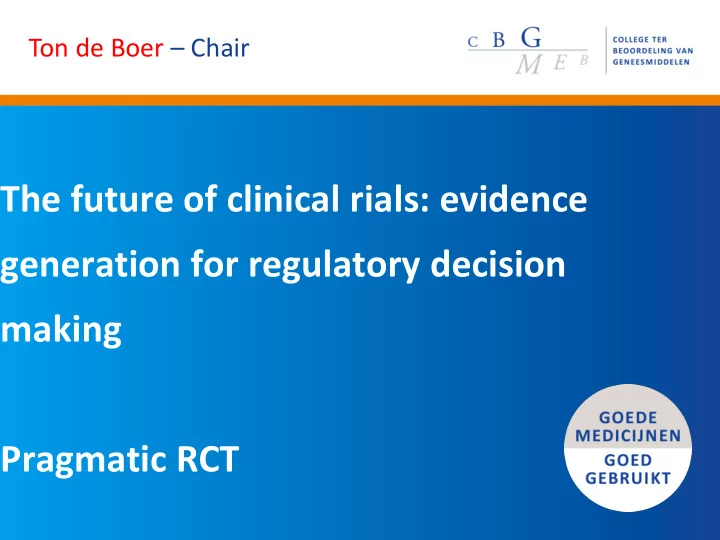

Ton de Boer – Chair The future of clinical rials: evidence generation for regulatory decision making Pragmatic RCT
Declaration of interests Professor of Pharmacotherapy (pharmacoepidemiologic research) Former Chairman of the Dutch Reimbursement Committee Chairman of the Dutch Medicines Evaluation Board (MEB), since August 1 st 2017. This talk reflects my personal views; I am being inspired and challenged by many colleagues within the MEB and university. 2
Pre-marketing randomized trials • Gold standard from the clinical research paradigm • Limitations • Highly selected patients groups • Relative short follow up • No real world data • Surrogate endpoints Limited knowledge of intended and unintended drug effects 3
Problems post marketing • After marketing we learn more about the safety of drugs “ not ” about the effectiveness • Thus after marketing the B/R ratio “ always ” becomes worse • Often we do not know the value of a new drug compared to existing therapies 4
Needs • Real world evidence (RWE) • Want to know how drugs perform in routine clinical pratice • Comparative effectiveness • Need for adequate data to guide choices among therapeutic alternatives • MEB regulator: need for valid RWE data. “ Unbiased ” effect estimates to be able to change drug labels 5
What is Real World Data? 6
Spectrum of terms are being used 7
RWD not collected in conventional RCTs? 8
RWD should be collected in premarketing randomized controlled trials • Obligatory prognostic factors and patients outcomes (defined in the case record forms) • Electronic health records • Diaries • Applications counting number of footsteps • Mobile Health APPS • Data from a (new) registry • (Costs) • Etc etc 9
Postmarketing RWD should be collected in randomized controlled trials • Pragmatic or (stepped wedge) cluster randomized (blinded) controlled trials • Randomization of patients or practices in daily practice (general practitioner, specialist, pharmacist) • Prognostic factors and patients outcomes from routinely collected electronic health records • Possible to evaluate clinically relevant intended and unintended effects (including mortality) 10
Problems to conduct pragmatic RCTs Recruitment of GPs and patients appeared to be highly problematic A major problem was the informed consent procedure Will lead to selected patient groups Simvastatin versus atorvastatin and immediate antibiotics versus deferred or non-use 11
EU regulations: definition of low intervention trials 12
EU regulations: informed consent is necessary when patients are randomized 13
BMJ 2019;364:l1092 doi: 10.1136/bmj.l1092 (Published 27 March 2019) 14
Is informed consent always necessary when performing a randomized trial with authorized drugs? • “Natural” randomisations happen all the time in daily practice • There should be “ equipose ” • Low risk trials • High social value • When informed consent seriously hampers the execution of a pragmatic RCT 15
Outside the EU: Modifications and waivers of informed consent in the context of a randomized study 16
Feasability of pragmatic RCTs without informed consent I • Equipoise situations (follow up study of the BMJ manuscript) • Existing guidelines? • Research protocol necessary with input from health care practitioners and patients • Assessment of the protocol by an ethics committee • General practitioners or specialists willing to participate in pragmatic RCTs • Software necessary to perform randomization • In an environment of electronic health records (e.g. PHARMO, CPRD) 17 •
Acceptability of pragmatic RCTs without informed consent I • “Natural” randomisations happen all the time in daily practice • There should be equipose • Low risk trials • High social value • When informed consent seriously hampers the execution of a pragmatic RCT 18
Acceptability of pragmatic RCTs without informed consent II • The standard paradigm in research ethics — where a sharp distinction is made between research and care — needs to be challenged. • Crucial that besides the randomisation procedure patients will only receive standard care • Debriefing patients after they have finsihed taking part? • General statement for patients that their GP participates in research to improve care 19
Recommend
More recommend